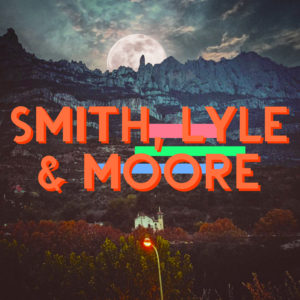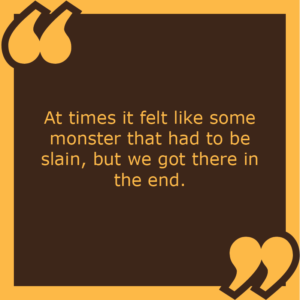 With the new single “Werewolf” just released, self-proclaimed musical perfectionists Smith, Lyle & Moore are eager to share their songs with the masses, though they admit to being unsure if they’ve caught creative lightening in a bottle – at least until they can see how audiences respond to their collective efforts.
With the new single “Werewolf” just released, self-proclaimed musical perfectionists Smith, Lyle & Moore are eager to share their songs with the masses, though they admit to being unsure if they’ve caught creative lightening in a bottle – at least until they can see how audiences respond to their collective efforts.
“There is perfection in imperfection, but if you are too close to something you sometimes can’t see the perfection in the imperfection – you just see the imperfection,” Andrew Smith said in an exclusive interview with TrunkSpace.
We recently sat down with Smith and Jack Moore to discuss their musical bond, recipe testing their secret sauce, and rewards yet to be achieved.
TrunkSpace: Prior to coming together, you had all found musical companionship in other bands and projects. What was it about this unit that clicked creatively when you began to flesh out your first batch of songs together?
Smith: With Tyler, lyricism. With Jack, his guitar playing. The first time I heard “And some days I am a… mother fucking werewolf” I fell in love with the song. It was unexpected, badass, and great. I had never heard anything like it, especially in the context of what came across as a typical folk song until that lyric. With Jack, there’s just a soul to his guitar playing that he must have latched on to from growing up around his dad. I’ve played guitar my whole life and know lots of “great” musicians. But emotion > technical ability, and the emotion of Jack’s playing is fantastic and unmatched in any guitarist I have played with.
Moore: I think the whole process felt natural from the get go. Andrew and I had very strong common ground with our influences, and leading with those in the making of the tracks we didn’t feel like we needed to deviate creatively from one another’s goals musically.
TrunkSpace: Is there such a thing as creative soulmates? Can musicians such as yourselves find creative kinship with some but not others?
Smith: With soulmates, there’s only supposed to be one for you in the world, right? In that case, no. There is no such thing as a musical soulmate. But like how you can have multiple best friends throughout your life, you can have multiple musical best-friends who you click with (but they don’t even have to be your friends – you can musically connect with a songwriter in a single session). A musical soulmate is pretty similar to finding a band you love – you just get to be involved in the creation of the music instead of just enjoying it.
Moore: Maybe even more so musically than romantically, in the way that I would go back to an old writing partner, but not an ex. (Laughter) And of course, in the same way as you have chemistry with someone’s personality you find it musically speaking also.
TrunkSpace: The band came together in a really organic way. Musically, does that put less pressure on you when you realize that you’re not creating to create, but instead, creating because the environment is perfect for it?
Smith: I think most non-boybands come together fairly organically. That being said, it’s the opposite for me – there is a lot of pressure inherent in a passion project because anything less than elusive “perfection” feels like failure. In that regard, maybe this project is a failure. (Laughter) But I love it and it is great… just not perfect. But is anything? Hm… There is perfection in imperfection, but if you are too close to something you sometimes can’t see the perfection in the imperfection – you just see the imperfection. Like if you stand at the base of a massive skyscraper, like 1 foot away from it, and have to analyze the beauty of its architecture, you’re gonna miss a lot of what’s going on. Maybe you focus on the handprint on the pane of glass in front of your face and it bugs you – you just want a crystal clear pane of glass there. If you stood at the base of the empire state building, you’d have almost no idea what makes it beautiful (the top is so cool and iconic!). I’m standing with my face pressed against the glass of the building blowing air into my cheeks. I can’t even tell if it’s a skyscraper or a house.
Moore: Absolutely, we always have a lot of fun when we write, and we really just try and make the best songs we can and do them justice for ourselves. I always just think, “what would I wanna hear” during the creation process. It’s something I think I’ll always stick by.
TrunkSpace: What kind of emotions do you juggle with when releasing new material to the masses, and is the experience different this time around given that the entire world, essentially, has ground to a halt?
Smith: The emotion is fear of failure and bouncing between thinking what you’ve created is great and horrible. The world grinding to a halt plays no role in the emotion involved in releasing music, for me.
Moore: I suppose the obvious is how it’s going to be received, and have you done everything you can possibly do to make it as good as it can be. That’s definitely been a recurring theme. People often ask about releasing in the pandemic, but I’d say it’s about par for the course for us given the list of unusual hurdles we have had to overcome making the record. I think the true impact lies with the live performance side of the music, not recorded as I’m sure there are a lot of people sitting around bored in the mood to discover some new music, so in some ways maybe we have a more captive, but also more anxious and frustrated audience. Time will tell.
TrunkSpace: Normally you would tour to support a new release, but that is not something that is possible in every state right now. How has promoting the upcoming music changed? How do you get the word out when people can’t get out themselves?
Smith: By being creative, hopefully. And/or by grinding it out. Throughout the span of this project coming to fruition, there have been a lot of creative things that we’ve tried to promote the music. For example, years ago there was a Snapchat hack that released about 5 million usernames and area codes. I downloaded the hack the day that news was released, and it was scrubbed from the internet shortly thereafter. I then created 650 different Snapchat accounts and coded something to add the hack-released-usernames to each of these accounts automatically. Each of the 650 accounts followed users from a specific area code. This would hypothetically allow for targeted promotion when on tour, by using area codes to deduce location of users. After adding all 5 million people, I ran tests on the accounts – a story posted to all of the accounts would be viewed by 500,000 people. Unfortunately, I was taken away from music for a couple years and in that time-frame Snapchat deactivated all of the accounts I created so I was never able to capitalize on it. I always wait too long – until things are too perfect – and it bit me and us in the ass, especially now understanding the value of having 500,000 eyes on something. My god… the lost opportunity… but thinking of creative ways to get yourself out there is what it’s all about; no music speaks for itself. No song uploaded without a push will become huge, in my opinion. You need to be creative in getting your music in front of people and into their ears. Is that from a creative video? Or some program you create? Or just by talking to lots of people and engaging with them? It could be any or all of the above. For us, it probably won’t be a video (at least with these four songs). So it will have to be something else. Or a combination of other things. We have a little bit of secret sauce and are recipe testing more secret sauce to find something that fits and works.
Moore: Certainly the landscape has changed here with regards of conventional promotion of a record – as you say it’s practically impossible to do any kind of congruent tour at the moment, so we have to rely on the recorded music to do the speaking. That definitely makes it more of a challenge, but a fun one too.
TrunkSpace: If someone sat down and listened to your upcoming EP front to back, what would they learn about you and where you’re at as a band and as songwriters in 2020?
Smith: They’d learn more about where we were in the past because these songs weren’t written this year. But I think the themes on this album are points of view on the world that still hold true – which is sort of what you want (sometimes)… to create something and say something that you still believe in years later. There is something special about a song that is very “2020” or very “1987” – a song that lives in a year – and there is also something special about songs that don’t. To me, these songs don’t.
Moore: I’d like to think it would give a great idea of the band’s energy and what’s to come. As a foundation, and thinking about the other songs we have written, I think we chose the best possible introductory four to give people a feel of what we’re about.
TrunkSpace: Outside of the music itself, what did you want to accomplish with the production of the EP and do you feel like you checked off all of the boxes when you called wrap?
Smith: To make something that feels new-old. To accomplish a timelessness and freshness at the same time. I’m way to close to the project to know if I checked off all of the boxes. I definitely didn’t check them all off. But I have too many boxes – i.e., does this record sound as good as a Bob Ludwig mastered Nigel Godrich Produced masterpiece? Hell no, unfortunately. But maybe those aspirations were unrealistic? Anything short of that feels like failure because I set a high bar. Probably the songs would benefit from another person mixing them (I produced and mixed). But they’re closer than they ever have been to what the vision was… I think. I have no perspective on them at all.
Moore: It’s funny, it feels like you lay down a marker in time when you write a song, the more powerful it is, the more you are able to recall who you were and how you felt at the time, and that certainly rings true with these songs.

TrunkSpace: What are you most proud of with the album?
Smith: The production elements.
Moore: I’m proud of overcoming everything that was thrown at us on the way, and being genuinely truly happy about how they sound individually and collectively. We’re pretty perfectionist in this band so it took a lot for us to go, “Okay, this is it.”
TrunkSpace: What has been the most rewarding aspect of creating together thus far? What has this project done for you personally that you felt was a missing component from those you participated in previously?
Smith: Working on music you love is rewarding. But nothing is ever finished. Sometimes I hear the songs and feel accomplished and like they’re great, and other times I don’t like them. It’s all perspective. And I truly have none. I’m pretty sure the songs are good.
The component that this project contains that others didn’t is that it was done purely out of an obsession to make something I liked; it wasn’t to deliver something specific to a label or manager of another artist. It was making music for fun… even though a lot of it wasn’t fun, it was torture… because when I work on something I love, I guess I sometimes beat it into the ground until I hate it and then take time away until I don’t hate it, and then do the same over and over. I guess the rewarding aspect of making this, for me, hasn’t been achieved. I will feel rewarded/accomplished if we can figure out how to get millions of streams on these songs. I need verification that they are good from something external. These songs are meant to be a stepping stone to a full record. I’ll feel accomplished if/when that full record comes out. It is mostly finished and fully recorded, we just need a push from people out in the world to make it come to fruition — we need people to love these songs and share them and in effect contribute to this project, to help push us to the next chapter.
Moore: It was just a super fun and diverse EP to create. It really dragged us everywhere, both emotionally and geographically. At times it felt like some monster that had to be slain, but we got there in the end.
TrunkSpace: Time machine question. If you could jump ahead 10 years and get a glimpse of what your career looks like a decade from now, would you take that journey? If not, why?
Smith: Sure – if we had any hits in 10 years, I could release them 10 years earlier and have 10 years more content out of the way. If history is a judge of the future, we’d need a time machine if we ever wanted to release a 2nd record… because these 4 songs took a long time… But in actuality, we have a full record basically finished and the reason these songs took so long is because I was learning who I was as a producer and engineer in the midst of making this record. I’m very fast and have a set-up that I understand and know how to use well now – something I didn’t have when this project started; the result is that I am able to lay down ideas quickly, efficiently, and well, and that allows for me to have more perspective and complete things quickly. Its all about perspective. Let me trade the time machine for a memory-eraser. I’d erase my memory every day. I’d make amazing music that sounds incredible if I could erase my memory everyday before working on the song I worked on yesterday.
Moore: I think it might spoil the fun. (Laughter) Besides, looking at it could influence you to do things differently which would alter the outcome of what you had seen, presumably. (Laughter) I think it’s just important to enjoy the journey of it all; the fun part is watching it all evolve.
“Werewolf” is available today.


